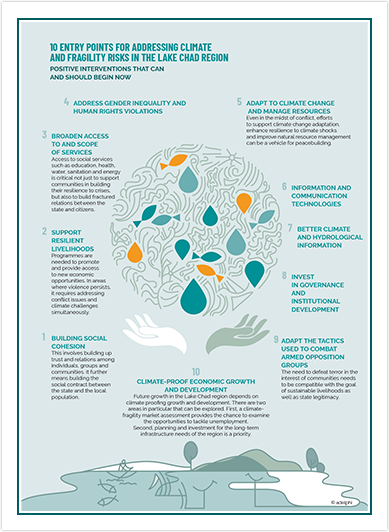KEY FINDINGS
Climate-related disasters and extensive conflicts are on the rise and they affect human security and sustainable development. When climate change and other conflict drivers converge, the consequences for individuals and communities can be devastating.”
Ulrika Modéer, Assistant Administrator and Director of the Bureau of External Relations and Advocacy, UNDP, February 2019
KEY FINDINGS
Since 2009, the parts of Nigeria, Niger, Chad and Cameroon bordering Lake Chad—which are home to more than 17.4 million people—have been locked into multiple and overlapping crises. Climate change is having profound adverse impacts on the conflict, intensifying existing dynamics and creating new risks. Communities in this region are thus vulnerable to both the impacts of climate change and the ongoing conflict. If the region is to break free of the conflict trap, we must tackle the impacts of climate change as part of peacebuilding efforts.
4 KEY CLIMATE-FRAGILITY RISKS IN THE REGION
Risk 1: Climate and conflict dynamics undermine livelihoods
Risk 2: Increased competition for natural resources
Risk 3: Recruitment into armed opposition groups
Risk 4: Heavy handed military response
Communities are vulnerable to both the rising impacts of climate change and the ongoing conflict. This creates its own feedback loop: violence undercuts communities’ capacity to adapt to climate change, but climate change undermines efforts to escape the conflict trap. While the situation varies significantly between and within countries, we identify four key climate-conflict risks.
Before, we had three options for farming. The first was during the rainy season. If the rain stopped, we were okay because we could go for our second option: farming irrigated by the stream, which does not require rain. If the stream dried up, we could go to the third – to Lake Chad to plant rice. Of course, the lake keeps changing so that is never certain, but all three disasters would not hit you in the same year. … But now …if one option fails – which is likely because of rainfall, security restrictions and armed fighters – you cannot do others.”
— Young male farmer in Monguno, Nigeria.
10 KEY ENTRY POINTS
- Building social cohesion
- Support resilient livelihoods
- Broaden access to and scope of services
- Address gender inequality and human rights violations
- Climate change adaptation and improved natural resource management
- Information and communication technologies
- Better climate and hydro logical information
- Invest in governance and institutional development
- Critically review and adapt the tactics used to combat armed opposition groups
- Climate-proof economic growth and development
The security, development and climatic challenges facing the Lake Chad region are complex and daunting. But there is much that can be done. We propose 10 broad interventions that go towards addressing the risks set out in the report.
A collective approach with strong emphasis on development alongside security and humanitarian responses is key to a sustainable development process and the achievement of a prosperous and peaceful Sahel. This requires promoting activities that ensure social cohesion, good governance, stability, and economic livelihoods.”

